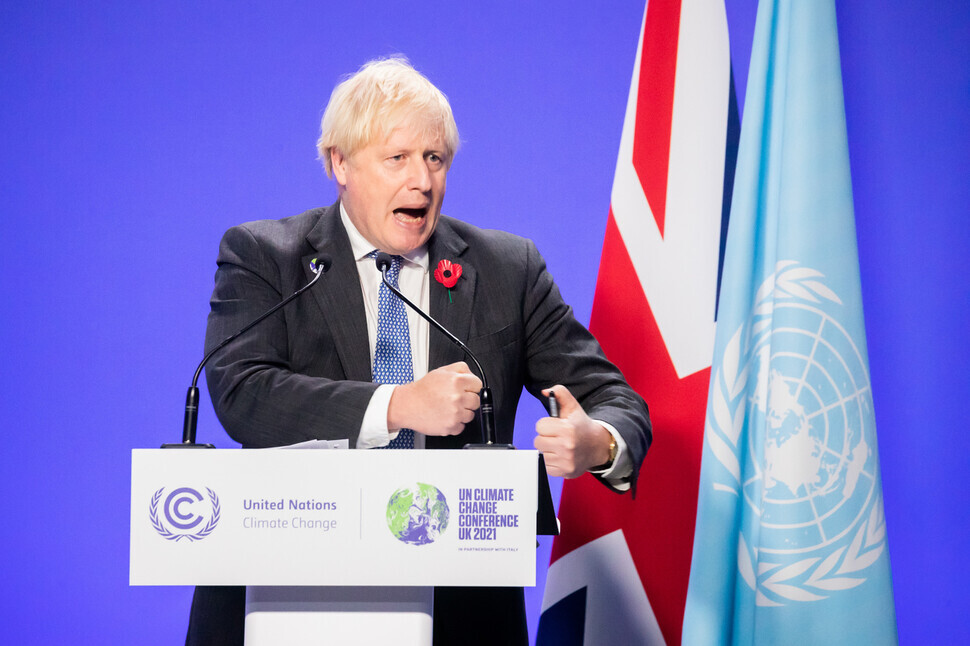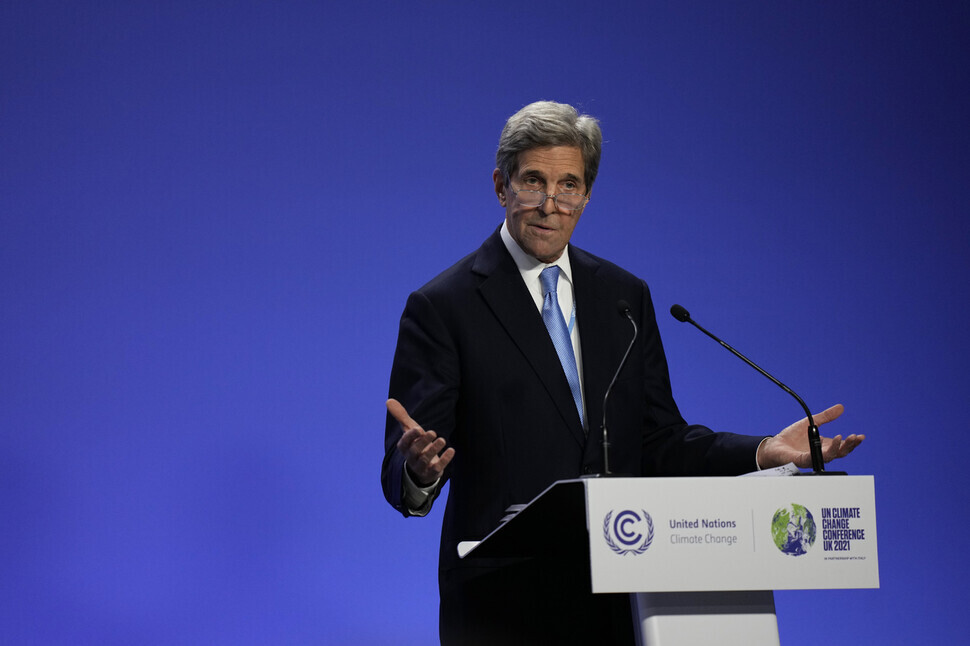hankyoreh
Links to other country sites 다른 나라 사이트 링크
Climate activists rebuke COP26 draft text as delaying action needed now

A draft deal made public on Wednesday from the 2021 UN Climate Change Conference (COP26) is coming under heavy fire.
The latest conference, a two-week event in Glasgow, had raised expectations by convening even amid the COVID-19 pandemic due to the urgency of taking action on the worsening climate crisis. But critics are calling the draft agreement a predictable disappointment.
Climate activists including Greta Thunberg responded with a petition condemning politicians and insisting that the UN declare a state of climate emergency along similar lines to its COVID-19 response.
Published on the UN Framework Convention on Climate Change homepage on Wednesday afternoon, the draft text for the COP26 official declaration includes eight main sections with a total of 84 items.
The terms refer to various tasks for humankind to respond to climate change, including scientific determinations, financial and fiscal support to developing countries, and cooperation. A particular focus is the draft text’s calls for carbon emissions to be reduced by 45% from 2010 levels by 2030, with the countries of the world urged to increase their carbon emission reduction targets by next year to this end.
But critics said the terms merely rehashed the areas emphasized in Intergovernmental Panel on Climate Change reports or put off discussions until next year without any immediate increase in the countries’ reduction targets.

COP26 President Alok Sharma announced plans for a path forward that involves balancing the three main themes of the Paris Agreement, namely finance (fiscal support), adaptation, and mitigation (carbon emission reduction). But the prevailing view among observers is that this will not be enough to resolve the issues left over from the Paris Agreement.
The draft text also includes a call for advanced economies to increase their financial support by double or more to help developing countries respond to the climate crisis.
But Aubrey Webson, chair of the Alliance of Small Island States (AOSIS), stressed that the plan should include additional measures to respond to the demand of the most vulnerable countries. The AOSIS is made up of 39 states that are particularly vulnerable to the effects of climate change.
One aspect that observers saw as a sign of progress in the COP26 declaration was the call for a gradual abolition of subsidies for coal and other fossil fuels.
This marks the first time the COP has made an explicit statement on the issue. But even that statement is seen as unlikely to be very effective, as the major countries that are heavily dependent on coal — including the US, China and South Korea — did not take part in the statement on reducing coal use.
The final declaration appears likely to be made public after a day or two of wording revisions once the conference ends Friday. This means that there is some room for modifications, but hopes are not high.

Climate and environment groups around the world were up in arms over the draft text. In particular, they stressed that the statement needs to include higher carbon emission reduction targets for 2030 and unambiguous wording about the abolition of subsidies for coal and other fossil fuels.
Greenpeace International Executive Director Jennifer Morgan called the document one-sided, noting that while the terms about gradually reducing coal and fossil fuel subsidies were a step in the right direction, the text included almost no reference to the demands of the countries that are most vulnerable to climate change.
Throughout the conference, the group Fridays for Future followed reporters around with calls to “stop messing around” and declarations that “we are leaders.” Thirteen young climate activists with that group joined Greta Thunberg in a petition asking UN Secretary-General António Guterres to declare a state of emergency on par with the COVID-19 pandemic.
In their statement, the petitioners urged the UN to declare a Level 3 state of emergency — as it did with the COVID-19 pandemic — while arguing that the UN had not used all of its institutional powers to respond to climate change.
They also called on it to quickly allocate UN resources and staff to support the countries that are most vulnerable to climate-related disasters.
By Choi Woo-ri and Kim Min Je, staff reporters
Please direct questions or comments to [english@hani.co.kr]

Editorial・opinion
![[Editorial] Penalties for airing allegations against Korea’s first lady endanger free press [Editorial] Penalties for airing allegations against Korea’s first lady endanger free press](https://flexible.img.hani.co.kr/flexible/normal/500/300/imgdb/original/2024/0502/1817146398095106.jpg) [Editorial] Penalties for airing allegations against Korea’s first lady endanger free press
[Editorial] Penalties for airing allegations against Korea’s first lady endanger free press![[Editorial] Yoon must halt procurement of SM-3 interceptor missiles [Editorial] Yoon must halt procurement of SM-3 interceptor missiles](https://flexible.img.hani.co.kr/flexible/normal/500/300/imgdb/child/2024/0501/17145495551605_1717145495195344.jpg) [Editorial] Yoon must halt procurement of SM-3 interceptor missiles
[Editorial] Yoon must halt procurement of SM-3 interceptor missiles- [Guest essay] Maybe Korea’s rapid population decline is an opportunity, not a crisis
- [Column] Can Yoon steer diplomacy with Russia, China back on track?
- [Column] Season 2 of special prosecutor probe may be coming to Korea soon
- [Column] Park Geun-hye déjà vu in Yoon Suk-yeol
- [Editorial] New weight of N. Korea’s nuclear threats makes dialogue all the more urgent
- [Guest essay] The real reason Korea’s new right wants to dub Rhee a founding father
- [Column] ‘Choson’: Is it time we start referring to N. Korea in its own terms?
- [Editorial] Japan’s rewriting of history with Korea has gone too far
Most viewed articles
- 160% of young Koreans see no need to have kids after marriage
- 2Months and months of overdue wages are pushing migrant workers in Korea into debt
- 3[Editorial] Penalties for airing allegations against Korea’s first lady endanger free press
- 4[Guest essay] Maybe Korea’s rapid population decline is an opportunity, not a crisis
- 51 in 3 S. Korean security experts support nuclear armament, CSIS finds
- 6[Reporter’s notebook] In Min’s world, she’s the artist — and NewJeans is her art
- 7Bills for Itaewon crush inquiry, special counsel probe into Marine’s death pass National Assembly
- 8S. Korea discusses participation in defense development with AUKUS alliance
- 9Japan’s standards for use of preemptive counterstrike against N. Korea remain unclear
- 10Trump asks why US would defend Korea, hints at hiking Seoul’s defense cost burden